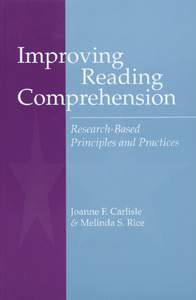Improving Reading Comprehension

Research-Based Principles and Practices What happens when one of your students seems able to read but doesn’t understand the written word?
This research-based and practical new book gives you a variety of ways to help students improve in reading comprehension. Whether you need a comprehensive look at the development of reading comprehension, a discussion of the challenges associated with identifying and addressing the needs of students with comprehension problems, or tested strategies and methods — along with supporting research — you’ll find it here.
Equally useful for teachers, teachers in training, researchers, and graduate students studying reading and reading difficulties, this book addresses a multitude of questions about reading comprehension. Each chapter opens with questions for you to consider as you read. Here are just a few of the issues you’ll find covered:
With questions like these to guide you through this text, you’ll see why it belongs among your trusted sources for ideas and solutions. In addition, most chapters conclude with “Commonly Asked Questions” along with helpful responses that will easily enable you to apply what you’ve learned. Consider some of the questions other instructors have asked:
You’ll also find a chapter devoted to classroom scenarios so that you can see research and application in practice. Improving Reading Comprehension will help put your students on the path to reading success.


